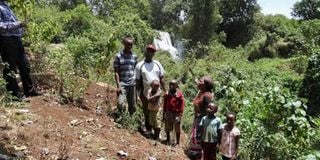Fears over Sh13bn Mwea irrigation project

Josephine Ndege on her farm in Baragwi Ward for which she has only been partially compensated to make way for the Thiba dam. PHOTO | BILLY MUIRURI |
What you need to know:
- New Mwea development scheme yet to kick off due to delays in paying the affected families.
- Construction of access roads has stalled while no water works are visible.
Hitches in a mega food security project threaten to create a huge squatter problem because of delay in compensating local families for their land.
The Sh13 billion Mwea Irrigation Development project has yet to begin despite Sh3.3 billion having been paid out to families in Kirinyaga County.
More than 614 families have been compensated, but they are yet to vacate their ancestral land because they are awaiting a final pay-out of about Sh2.1 billion, according to documents at the National Irrigation Board, the project implementers.
An additional 95 families are yet to be paid a total of Sh270 million. They are also staying put on the site here the dam is to be built.
The rice project conceived almost 20 years ago is funded jointly by the Kenya government and the Japanese donor agency JICA.
Families that have been paid cannot move to their new resettlement areas because of a lack of infrastructure there. A Kenyan contractor is yet to set up the needed amenities.
The Vision 2030 project is set to expand the 25,000-acre Mwea Irrigation scheme by another 22,000 acres. It faces the challenge of distinguishing between genuine beneficiaries and squatters.
HAS STALLED
A Sunday Nation visit to the dam — along Thiba River in Kabare and Baragwi locations in Gichugu Constituency — found the families busy farming.
Elders say if the families are not paid the entire amount soon, they may be forcibly evicted.
The government needed 550 acres to resettle them but has only managed to buy two pieces of land measuring a total of 350 acres from AHITI Ndomba and Gathigiriri GK prison in Mwea.
Infrastructural works to prepare the land for resettlement has stalled after the money to pay the contractor was held up by bureaucracy, according to the project’s documents.
At Ndomba Farm, for example, construction of access roads has stalled while no water works were visible on the ground. At Gathigiriri farm, construction machinery lies idle with no sign that the area could be ready for resettlement any time soon.
What is worrying local leaders is that those paid have spent almost all the money and are returning to farm the pieces of land for which they received the compensation.
The chairman of Project Affected Persons (PAPs), Julius Ceasar Njagi, says, “The delay to pay land owners is creating squatters. People are returning to their farms. The repercussions will be grave.”
According to the Resettlement Implementation Unit (RIU), under the National Irrigation Board, 560 acres with 253 registered land parcels were earmarked for acquisition at the dam, with 709 beneficiaries.
Project coordinator Julius Mutuaruciu, confirmed Sh2.1 billion was standing in the way of full compensation.
“Some 95 people are yet to be compensated, to the tune of Sh270 million. A further Sh340 million 'disturbance' payment is needed, which is 15 per cent of each person’s compensation,” he said. “And an extra Sh1.3 billion is needed for those at the irrigation area in Mutithi and Kangai.




